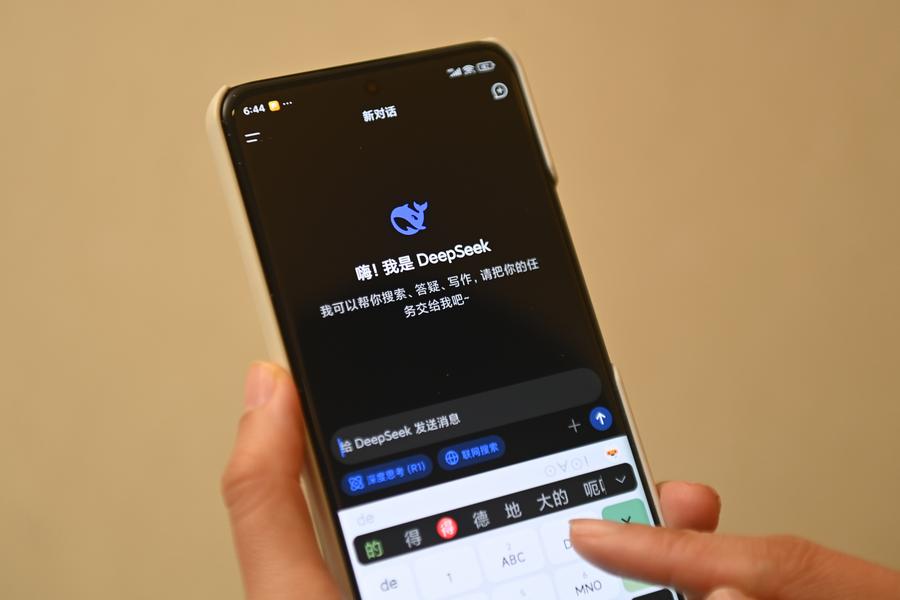
The emergence of DeepSeek, a large language model developed in China, is a landmark in AI development. Much like the symbolic hammer throw in Apple's advertisement in 1984, DeepSeek represents a breakthrough moment, disrupting the technological status quo and bringing advanced AI capabilities to users across the world.
Unlike earlier AI models that required significant computational resources and involved high costs, DeepSeek is both high-performing and accessible. Its open-source model has lowered entry barriers and stimulated healthy competition in the AI industry, creating new opportunities across sectors, including in governance.
In Shenzhen, 70 AI-powered "civil servants" have reportedly been deployed in different government departments to assist with tasks such as drafting official documents, responding to public inquiries, identifying legal violations and formulating contingency plans. Work that once took civil servants days to complete can now be done in a matter of minutes.
READ MORE: China strives to cultivate tech-savvy generation in AI-driven classrooms
This leap in productivity has not only increased efficiency; it has also reduced operational costs and enhanced transparency. Mistakes and oversights that often elude human detection are more readily caught by machine learning algorithms. In one striking example from the United States, a group of technicians and engineers, aged 19 to 24 and led by Tesla and SpaceX founder Elon Musk, reportedly discovered a glaring flaw in welfare records: a 300-year-old "recipient" was still receiving benefits. This absurdity had long escaped manual audits but was instantly flagged by AI. With AI's inclusion in administrative work, public services will likely be more agile and equitable.
A key aspect of AI in governance lies in personalization. Traditionally, government services have been characterized by standardized procedures and slow bureaucratic processes. But with AI models such as DeepSeek, a shift toward personalized governance is becoming possible. Imagine a world where every citizen has a personal AI assistant connected to a broader, government-operated AI system.
Rather than submitting reams of documents and waiting weeks for a response to an application for a housing loan, an individual's personal AI could securely share relevant information with a government AI system, leading to near-instantaneous decisions. This shift from "one-size-fits-all" administration to bespoke digital services would redefine the nature of public service.
As AI becomes increasingly intelligent — people like Musk claim AI will be smarter than individual humans by 2026 and more intelligent than all human intelligence combined by 2029-does it mean we no longer need flesh-and-blood civil servants? Not quite.
While AI will undoubtedly reduce the size of the public workforce, humans will continue to play indispensable roles — as supervisors, ethical stewards and final arbiters in complex decisions. In fiscal budget management, for example, AI can monitor, analyze and optimize public spending in real time. Still, human oversight committees will be needed to ensure that algorithmic decisions remain aligned with ethical standards and do not disadvantage vulnerable populations. It is dangerously naïve to assume that AI will always act in the best interests of humankind. This belief, often referred to as "anthropocentrism", may eventually prove as outdated as the geocentric model of the universe. To safeguard public interest, governments must establish ethics committees to audit AI systems, revise regulatory frameworks, and ensure transparency. Such committees will be critical to preserving trust in AI-enabled governance.
But no revolution comes without disruption. As AI assumes many traditional civil service roles, mass job displacement could trigger deep social anxiety. Questions, such as "Am I still useful if a machine can do my job?", will become increasingly common. Governments must be prepared to mitigate this social fallout by investing in mental health services, job retraining programs and welfare support.
ALSO READ: Tech narratives equally vital in AI progress
In the short term, these interventions will be essential to maintain social stability. In the long term, however, the efficiency gained from AI may allow governments to redirect saved human and financial resources to fulfill the pressing needs in sectors such as education, healthcare and social protection. Like the impact of the internet, which democratized access to information and reduced global knowledge gaps, AI's application in public governance could redistribute social resources more equitably and unlock human potential in new ways.
In sum, AI in government is not just a matter of automation; it's about revolutionizing governance itself. If done right, an AI-powered state can more fairly and quickly fulfill citizens' needs. But to get there, we need to strike a balance between efficiency and ethics, innovation and inclusion.
The author is an associate professor at the Chinese University of Hong Kong with joint appointments in the Department of Psychology, the School of Journalism and Communication, and the School of Governance and Policy Science.
The views don't necessarily reflect those of China Daily.


